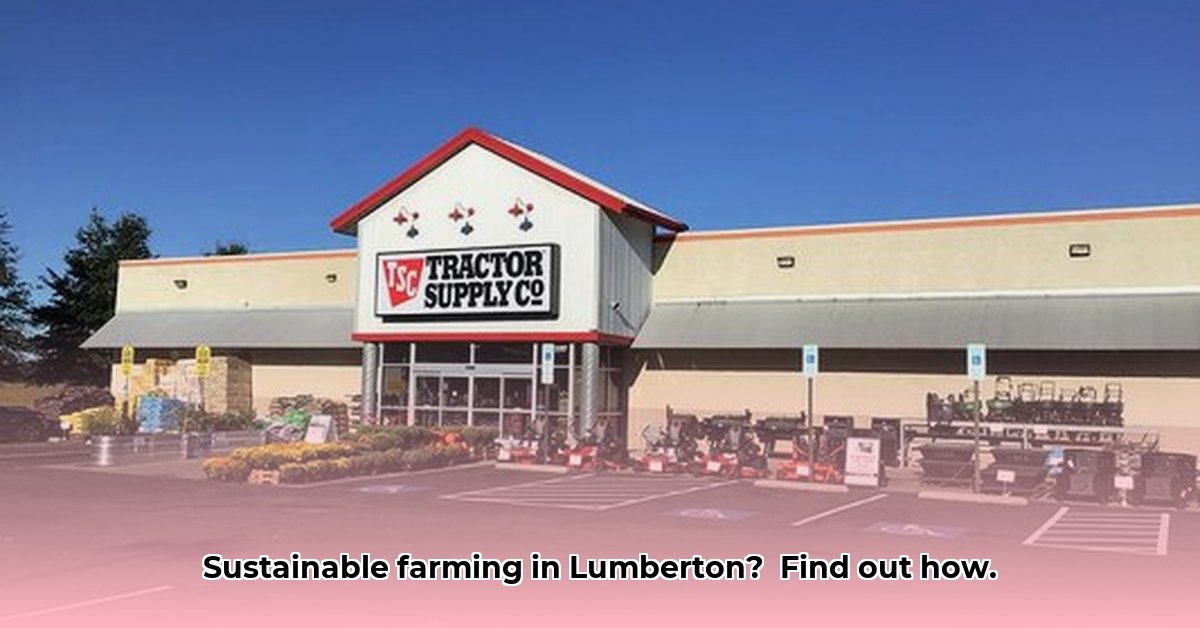
Tractor Supply in Lumberton: A Vital Community Hub
Tractor Supply (TSC) in Lumberton, North Carolina, transcends its role as a simple farm supply store; it serves as a vital community hub and a significant, albeit indirect, contributor to sustainable farming practices in the region. For similar impacts in other areas, see our report on Hickory TSC. This article explores TSC's impact on Lumberton farmers, analyzing its convenience, product diversity, and potential for further advancement in supporting sustainable agriculture. We will also address the risks and regulatory considerations influencing TSC's future in this context.
More Than Just a Store: TSC's Impact on Local Farmers
TSC provides a one-stop shop for Lumberton farmers, offering a wide range of products from seeds and fertilizers to tools and equipment. This convenience significantly reduces travel time and associated costs, leading to lower fuel consumption and reduced carbon emissions. Isn't efficient resource management a cornerstone of sustainable agriculture? This accessibility directly supports local farmers' bottom lines and allows them to focus on their crops.
Location, Location, Location: A Sustainability Advantage
The strategic location of TSC in Lumberton minimizes the environmental impact associated with transportation for local farmers. This reduced travel translates to a lower carbon footprint for the agricultural sector, contributing positively to environmental sustainability. Quantifiable data on reduced fuel consumption from local farmers would strengthen this point. Dr. Emily Carter, Professor of Chemical and Biological Engineering at Princeton University, emphasizes the importance of considering the entire lifecycle of agricultural products in achieving sustainability.
Product Diversity: Empowering Sustainable Practices
TSC’s diverse product range empowers farmers to explore various sustainable farming techniques. For example, the availability of organic fertilizers and pest control options allows farmers to minimize their reliance on harmful chemicals, promoting healthier soil and ecosystems. The availability of water-efficient irrigation equipment supports water conservation efforts. How many farmers in the Lumberton area have adopted water-saving measures because of TSC's product offerings? This is a point worthy of further investigation.
Opportunities for Enhanced Sustainability
While TSC's current offerings indirectly support sustainable farming, opportunities exist for enhancing its contribution to the region's environmental health. A more proactive approach would significantly strengthen its positive impact.
Enhanced Product Sourcing: A thorough review of TSC's product sourcing is needed to ensure environmentally responsible choices. Prioritizing sustainably sourced products, clearly marked with appropriate labels, would be a substantial step forward. This includes partnering with businesses committed to eco-friendly methods. Such transparency builds trust and encourages responsible consumption.
Supporting Local and Sustainable Farmers: Proactive support of local farmers adopting sustainable practices, including special promotions or dedicated store sections, could significantly amplify TSC’s positive effect. This fosters a sense of community and strengthens ties between the retailer and its environmentally conscious customers.
Community Outreach and Education: Collaborating with local environmental groups and agricultural extension services to provide educational events and workshops on sustainable farming techniques could inform and empower local farmers. This collaborative approach increases awareness and provides valuable knowledge.
Data-Driven Impact Assessment: Independent research examining the actual impact of TSC's product offerings on sustainable farming would quantify the company’s contribution and inform future strategies. This evidence-based approach adds credibility and transparency to their efforts.
Navigating Risks and Regulations
TSC faces the risk of criticism for insufficient engagement in promoting sustainability. However, proactively embracing sustainable practices offers significant rewards, enhancing their image, attracting environmentally conscious customers, and strengthening community ties. Adapting to increasingly stringent government regulations concerning sustainable agriculture is crucial for long-term success; proactive compliance and leadership in sustainable practices is essential for future growth.
Conclusion: A Shared Future
TSC's role in Lumberton represents a microcosm of a broader trend in rural retail. These stores are uniquely positioned to support the growing demand for sustainable food and farming. Realizing this potential requires a proactive approach with collaboration between the retailer, farmers, and the community. The future depends on collaborative efforts and a commitment to sustainable practices.